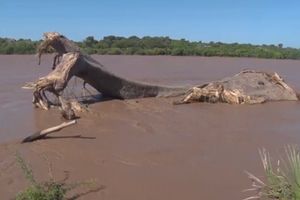Cholera cases on the rise amid devastating floods

A flooded Mathare River as it passes through Mathare Slums Gitathuru area.
What you need to know:
- Cholera, a bacterial infection caused by ingesting contaminated food or water, leads to severe dehydration and can be fatal within hours if left untreated.
- Communities are being advised to boil or treat drinking water, practice regular handwashing, and seek immediate medical attention for symptoms of cholera.
The country has recorded 34 cholera cases, attributed to the widespread flooding affecting various parts of the country.
Public Health and Professional Standards Principal Secretary Mary Muthoni said the long rains have destroyed sanitation facilities (latrines), resulting in the collapse and filling of latrines with flood water contaminating water sources with faecal matter.
Inadequate sanitation facilities, limited water and hygiene, and untreated water consumption could worsen the situation in overcrowded rescue camps, Ms Muthoni said.
The cases have been reported in Tana River County with Garsen West Ward reporting 32 cases and Garsen Central reporting two cases.
Other countries have yet to report their cases to the Ministry.
Cholera is often linked to unhygienic conditions, a significant worry for those already struggling with displacement.
Hygiene is lacking in most rescue centers, and many in Tana River share inadequate toilets.
As heavy rains continue to flood the country, contaminated water sources have become a breeding ground for cholera bacteria, posing a serious threat to public health.
Apart from cholera, suspected diarrheal cases have also been reported in Marsabit County.
“Contaminated water sources are infiltrating homes and displacing communities, heightening the risk of exposure to cholera-causing bacteria. Urgent actions are required to mitigate the impact of this outbreak and prevent further spread of the disease,” Ms Muthoni said.
According to Ms Muthoni, the primary cause of cholera transmission appears to be contaminated water sources, compounded by inadequate sanitation practices in affected areas. Efforts are underway to identify and rectify these sources of contamination to prevent further spread of the disease.
"If you are in an area without access to water, there is a risk of consuming unwashed food and eating without cleaning your hands. This can result in ingestion of faecal matter," Ms Muthoni said.
“Despite our successful control efforts, the ongoing heavy rains and flooding have led to a confirmed case of cholera reported on April 26, 2024 in Tana River County.
"This single case is significant, as it amounts to an outbreak. There are additional reports of suspected diarrhoeal cases in Marsabit County. This underscores the immediate and considerable risk of waterborne diseases during this time,” Ms Muthoni said.
She adds: “Waterborne diseases including cholera are indeed severe, but they are also preventable. Understanding that early detection and prompt medical attention can make a significant difference, potentially saving lives is crucial.”
In response to the outbreak, public health campaigns have been launched to raise awareness about cholera prevention and the importance of proper hygiene practices.
Communities are being advised to boil or treat drinking water, practice regular handwashing, and seek immediate medical attention for symptoms of cholera.
“We are providing cholera contingency supplies to assist in the management of patients while distributing supplies to help purify water sources and treat household water in all high-risk areas and rescue camps,” Ms Muthoni said.
Cholera, a bacterial infection caused by ingesting contaminated food or water, leads to severe dehydration and can be fatal within hours if left untreated.
Dr Ojwang Lusi, a public health expert, says the country needs to start educating Kenyans on the risk that comes with the disease and how fatal it is.
“All we need to do is start educating people on the risk that comes with poor handling of food, they also need to observe hygiene by boiling water before drinking.
"With the drought that has hit the country, water is scarce and people are consuming dirty water. We may record more cases,” Dr Lusi warns, observing that public health awareness seems to have been neglected in the country.
Cholera is easy to detect since its incubation period is three to five days. Other diseases resulting from contaminated food or water such as typhoid take longer to show symptoms.
It infects a person’s intestines. Symptoms include watery diarrhoea and vomiting.
Patients are advised to take large quantities of an oral rehydration solution containing sugar and salt.
The disease can easily be prevented. One is advised to eat food cooked and served hot and to drink beverages from sealed bottles or cans.
Careful hand hygiene should be observed. Food handlers must wash their hands with soap and clean water and after using the bathroom.





